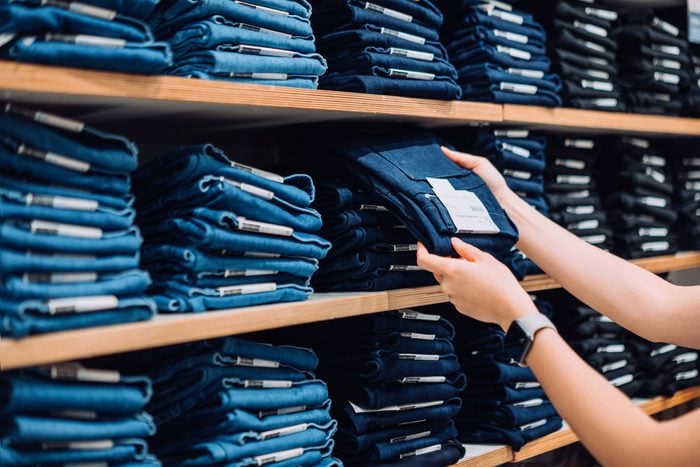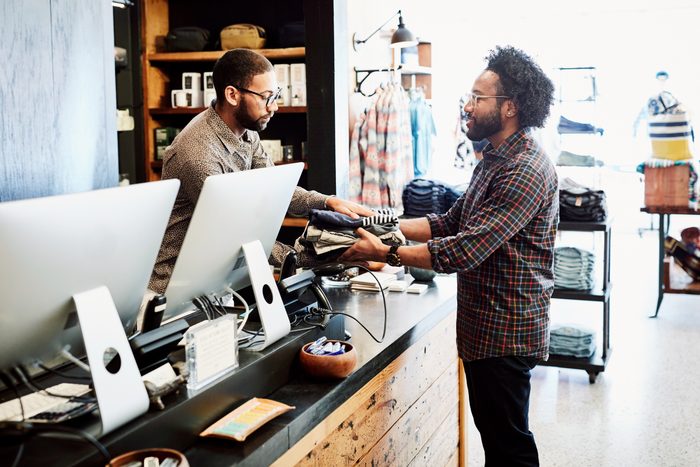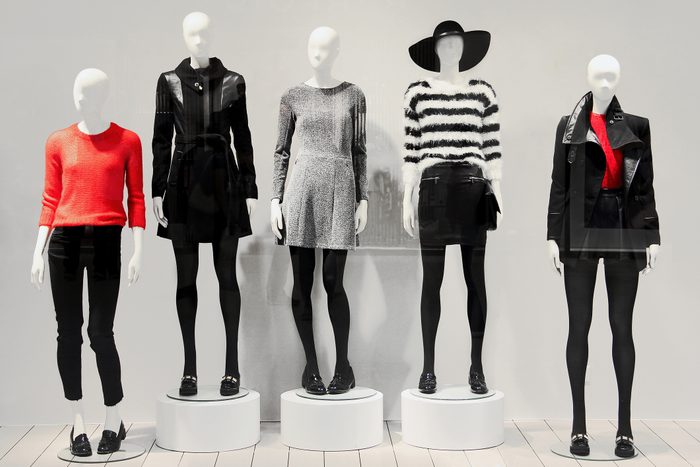
Retail store etiquette mistakes
It’s no secret that retail workers put up with a lot: low pay, long hours and lots of shoppers. And while the customer is always right, they’re not always the nicest. Still, most of us aren’t rude or trying to make workers’ lives harder—we genuinely want to be helpful and follow the etiquette rules. But there are some “polite” things we all do that actually get in the way of them doing their jobs … or that are just plain annoying.
“One time, a lady came through and switched all the sizes to move the larger sizes to the front of the racks and top of the tables,” says Ethan S., an Old Navy manager in Minnesota. “She pointed out that the average American woman is a size 10 or 12, so those sizes should be the easiest to see and find. And I had to admit, she made a good point.”
Unfortunately, while he agreed with her on principle, it wasn’t a personal choice. Corporate rules stated that the clothing must be hung or stacked from smallest to largest, with the smallest being on top or in front. The shopper’s unintentional etiquette mistake ended up making more work for the staff. “I appreciated what she was trying to do, but we had to put everything back after she left, and it took forever,” he says. “She did it randomly, so we weren’t sure which ones got switched and which ones didn’t, so we had to go through our entire women’s area.”
This may be a slightly extreme example, but it’s just one of many well-intentioned etiquette mistakes people make while shopping that end up causing more work for the employees. To find out which other so-called polite habits people secretly dislike, we talked to Old Navy employees who deal with customers all the time. If you think Ethan’s story was bonkers, read on to hear other shopping stories that will shock you and maybe make you laugh.
Get Reader’s Digest’s Read Up newsletter for more etiquette tips, humor, cleaning, travel, tech and fun facts all week long.

Sorting through stacks of clothes to find your size
Old Navy team members aren’t there to be personal shoppers, but they do want to help. One way, in particular, is by finding a particular size for you … especially if you’re moving stacks of clothing around trying to find that last “medium” in the pile.
“When I say, ‘Oh, can I help you find a size?’ that’s my polite way of saying that you’re messing up the area I just organized,” says Linea G., an Old Navy employee in California. She appreciates it when customers try to be independent and find things themselves, but it ends up being more polite to just ask for help if an item isn’t easily in reach. “I know where everything is anyhow, and if we have more sizes,” she says.
Do this instead: Don’t worry about being annoying. Instead, ask for help when you need it. “You’re not bothering me,” Linea adds. “That’s my job.”

Asking if they like their job
“At least once a day, someone will ask me how I like working here, and I know they are just trying to make polite conversation, but there’s really no right way to answer that question,” Ethan says. Like most folks, he likes his job sometimes, but other days, it’s just … work. And working can be a grind—especially when he’s on duty to clean the bathroom.
“If I say I don’t like it, what are they going to do? Feel bad? So I just lie and say it’s great. Then they leave happy, but it makes me depressed because I feel like I have to put on a fake front for people. I’d rather they just didn’t ask that question.”
Do this instead: If you want to make small talk with the employee, simply ask them how they are doing or make a comment about the weather. Given the employee-customer relationship, you simply need to say enough to be polite—not learn their life story.

Listening to the entire credit card spiel when you know you don’t want one
There was one thing all the Old Navy employees we talked to agreed on: The pressure to get customers to sign up for the store credit card is immense and generally the most stressful part of the job. (It’s also a source of stress for customers who don’t want to be asked repeatedly.) “I have had more than one customer listen for like five minutes while I’m trying to sell them on our credit card, just to tell me they already have it,” Linea says. “When I’m like, ‘Why didn’t you just tell me that?’ They’ll say, ‘I didn’t want to be rude and interrupt you.’ Please, please interrupt me in that situation!”
Do this instead: Alleviate the stress for both of you by resisting the urge to listen to the full sales pitch out of politeness. If you know you don’t want the card, have your credit frozen or already have the card, speak up. Linea says it’s best to interrupt with a kind but clear, “No thanks.” Not sure what to say after? Redirect the conversation with these conversation starters.

Asking personal questions
We get it: It’s awkward standing around saying nothing while the cashier rings up your items. (And scrolling on your phone when a service worker is helping you is an etiquette no-no.) This situation is the reason polite small talk exists! You just need to be careful about the questions you ask. “I love it when people ask me questions about style or fashion. I mean, I do work in a clothing store!” says Olivia P., who works at Gap and Old Navy in Texas. “But I hate it when people try to get really personal with me. I’m smiling, but that’s my job. We’re not friends.”
So what kind of oddly private details do customers want to know? “Probably the strangest one I get often is: ‘Is that your real name on your name tag?'” Olivia says. “It is, but if it wasn’t, then there’s a reason for that, and I wouldn’t tell you.”
Do this instead: Stick with questions related to the product or store, and avoid personal topics. The employees we talked to said too-personal questions include those centered on their family, their age, what they are doing later that night, if they go to school and where, if they’re religious and “polite” questions about their gender or sexuality. Blake, an Old Navy team member in Washington, says it’s not uncommon for customers to ask if he’s gay—not in a derogatory way but because they assume he’ll give better fashion advice than a straight man. “Whether or not I’m gay is none of their business, and also, that stereotype is so 2010,” he says.

Dressing the mannequins
The clothing on the displays and mannequins is for sale, and sometimes the last item in the size you want happens to be on a display. The employees look busy, so you’ll just take it off yourself—how hard could it be? “It’s harder than you think,” Blake says. “Those mannequins are heavy and hard to move.”
He adds that people will try to remove the item of clothing in the way they would from a living person, such as by raising the arms and lifting a shirt over the head. But the store mannequins’ limbs don’t bend like human limbs—they detach. This can lead to pieces of the mannequin landing on people or the whole thing toppling over on you, he says. This can be embarrassing or terrifying, depending on how prepared you are for a disembodied arm to karate-chop you. What’s more, customers will sometimes try to redress a half-clothed mannequin with equally disastrous results.
Do this instead: “People have told me that our mannequins are ‘nightmare fuel’ due to situations like this! Please, just ask us for help. We will be more than happy to get the item you need,” Blake says. “And we’ll take care of making sure the mannequins aren’t naked!” By the way, this is also top of the list of Victoria’s Secret employees’ pet peeves.

Refolding or putting away clothing
You’re browsing for a business-casual outfit when you come across a stack of sweaters that might be the perfect fit. You lift one out of the pile to get a better look … and realize it’s not right at all. If you’ve never worked retail, you no doubt assume that the kindest thing you can do for a store’s hardworking employees is ease the burden by folding clothing you’ve looked at but don’t plan to buy.
Unfortunately, this seemingly polite act doesn’t actually help. “We have to fold things a certain way, and most customers don’t know how to do that,” says Olivia. “Even if you’ve worked retail in the past, it’s probably not still the same.”
Do this instead: It’s totally fine to pick up an item of clothing, but when you’re done, simply place the item back on the table or hand it to an associate, says Olivia. This is especially true in the fitting rooms, Blake adds. Don’t leave unwanted items in the fitting room, and don’t try to put them back yourself. Simply hang them on the return rack in the fitting room area, and the fitting room attendant will take care of it from there, he says.

Offering snacks
You really shouldn’t be eating food in retail stores, but sometimes you just need a little snack (and some stores even sell candy and other prepackaged foods). If you’re eating something near an employee, the polite thing to do would be to offer to share, right? No thanks, Olivia says. “The other day, this guy held out his bag of candy and offered me some, which was way nice, but no. Just no,” she says. “I don’t know where that’s been or if there’s something in there, and I’m also not allowed to eat on the floor.”
Do this instead: When you get the urge to share food, resist. Show your gratitude and kindness with words instead. “If you want to tell me thanks, just say it. I always love hearing that,” she says.

Shaming the company for making them work holidays
Perhaps in an attempt to commiserate or make small talk, customers will sometimes say, “It’s such a shame you have to work Thanksgiving Day” or “They shouldn’t make you work on Christmas” to the cashier—as the cashier is ringing up their items. “The intent is probably nice, but my company isn’t making me work the holiday. You, the customers, are,” says Lizzy V., who worked at Old Navy’s sister store, Gap, in South Carolina.
Your “polite” comment really highlights how much you are inconveniencing the store’s employees. She points out that if no one shopped on holidays, stores wouldn’t be open. In addition, many retail workers choose to work holiday shifts for the extra pay or because everyone needs to take a turn.
Do this instead: Don’t point out the fact that they’re working on a holiday. A better tactic is to follow small talk etiquette and thank them for their help, wishing them a happy holiday.

Joking about free merch
Joking is one way to keep things lighthearted, especially if something is going wrong with the checkout process. But there is one joke that annoys more than it helps, Ethan says. You’ve probably heard it (or even said it) yourself a few times: “Oh, it won’t scan? I guess it’s free!”
So what about this joke makes retail workers cringe? It’s not so much that it’s a terrible joke itself but rather that they have to hear it 50 times a day, he says. “It’s one of the top five worst dad jokes ever!”
Do this instead: Store employees aren’t relying on you to be the comic relief, so it’s more than fine to simply wait patiently as the worker proceeds through the checkout process. And while we’re on the topic of jokes: Retail workers also don’t find it funny when you joke about their physical appearance, another customer, their age or something inappropriate, like politics or sex.

Volunteering your credit score
Did you decide that you do want to sign up for that Old Navy credit card? You probably want to do everything you can to hurry the process along, for the cashier’s sake as much as yours. In an effort to be polite, customers may volunteer information like their credit score, try to explain the reason their score is low or offer up other personal financial details.
“I actually have no idea how our credit-check process works,” Linea says. “All I know is whether or not you are able to finish the process of signing up. If you want to know why you were declined, I have a number I can give you to call, but that’s it.”
Do this instead: Keep personal financial details, including your credit score and credit history, to yourself. If you’re curious why the sign-up process has stalled, you can ask the employee. But skip the private info—that’s between you and the credit card company.

Reorganizing the merchandise
Old Navy stores can sometimes look like chaos—but it’s organized chaos (usually), Ethan says. Customers don’t always understand the method behind the madness, and so, trying to be helpful, they may reorganize a little bit. It’s something he sees a lot.
One of the most common ways customers try to help organize is by taking things from the “family” display at the front of the store and putting them with their gender and age. “But the whole point of that display is to show how items from the various departments match or coordinate. Like, you can get matching holiday pajamas for the whole family, in every gender, age and size. That’s kind of our thing, honestly,” he says. “Please just don’t touch any of the mannequins or displays.”
Do this instead: Even if you think you know a better or more efficient way for things to be organized, just let them be. If you really want, you can offer your idea as a suggestion to the manager, but chances are, they have to follow corporate rules, he adds.

Asking if they know other employees
If you’re the sort of person who will talk to anyone, you probably like to make a little small talk with the salesperson who’s ringing you up. It’s no doubt polite, but be warned: Certain topics secretly annoy retail workers. Like asking if they know so-and-so, who also works for the company.
Most retail chains have thousands of employees, so telling the salesperson who’s ringing you up about your niece who works at one of the chain’s stores across the country isn’t necessary. And if you’re browsing a local mom-and-pop shop where co-workers do know one another, asking those on duty to pass on a message from you is just adding to their workload.
Do this instead: “Please don’t ask me if I know another employee at the store because I probably don’t, but even if I did, I’m not going to talk to you about them,” Blake says. “I have people come in and say, ‘Will you tell so-and-so hi from me?’ That’s nice for them, but you’re basically giving me more work to do, and I’m not going to remember your name or message, especially if you came in during a busy time.” Instead, keep small talk to topics like the goods you’re buying or the weather.
About the experts
Last names have been withheld to protect the identities of the retail workers who talked to Reader’s Digest.
- Ethan S. is an Old Navy manager in Minnesota.
- Linea G. is an Old Navy employee in California.
- Olivia P. works at Gap and Old Navy in Texas.
- Blake is an Old Navy team member in Washington.
- Lizzy V. worked at Old Navy’s sister store, Gap, in South Carolina.
